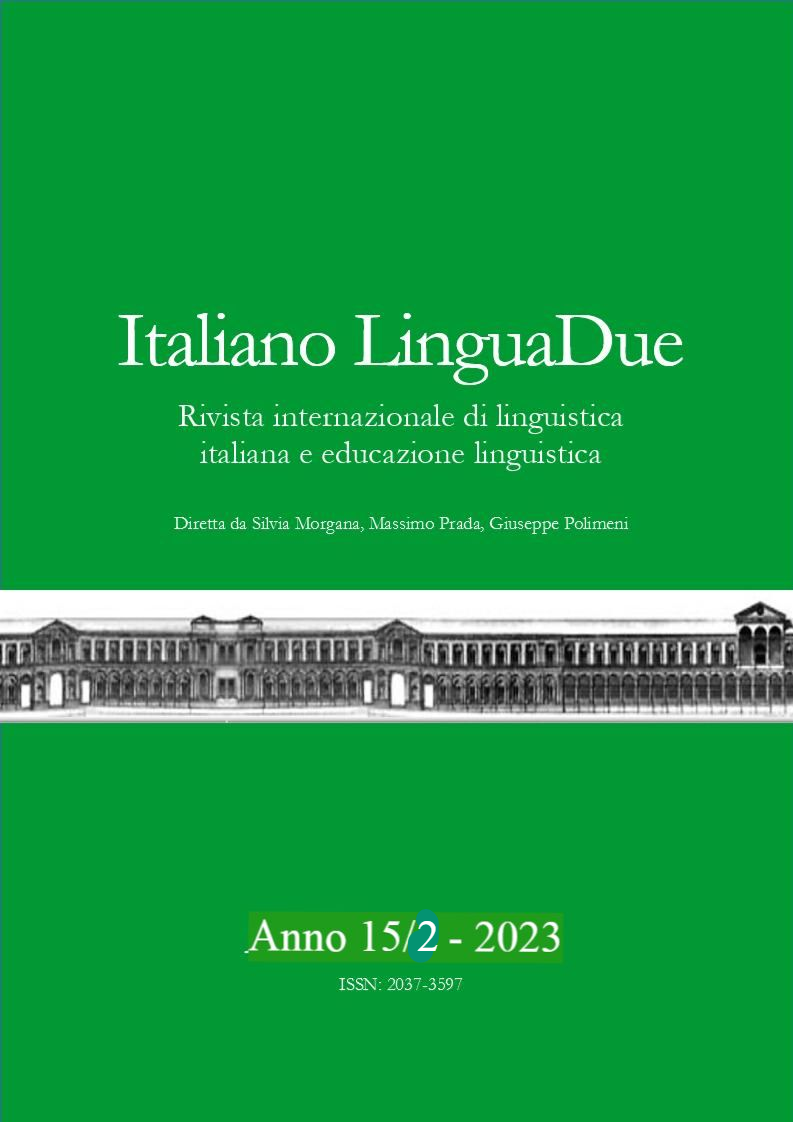IL FENOMENO DELL’IRONIA TRA CONCEZIONE «ECOICA» E APPROCCIO AUSTINIANO
DOI:
https://doi.org/10.54103/2037-3597/22022Abstract
Il presente contributo si concentra sul fenomeno dell’ironia verbale intesa come modalità marcata della comunicazione indiretta. In particolare, si intende discutere la cosiddetta concezione “ecoica” proposta dalla Teoria della Pertinenza (Sperber, Wilson, in part. 1978; 1981; cfr. anche Colston, Gibbs, 2007), per illustrarne da un lato l’originalità e l’innovatività rispetto ai quadri interpretativi del passato, dall’altro per evidenziarne le questioni lasciate aperte – soprattutto per alcuni limiti generali insiti nell’approccio pertinentista (cfr. Bianchi, 2009) – che di fatto costituiscono gli interrogativi irrisolti sul tema. Alla luce di questa analisi, saranno proposti alcuni spunti di integrazione alla suddetta teoria, sviluppando i suggerimenti provenienti dalle ricerche di Tommaso Russo Cardona (2017) e la sua proposta di analizzare l’ironia alla luce della Speech Acts Theory austiniana.
Verbal irony between the “ecoic” conception and the austinian approach
This contribution focuses on verbal irony as a marked mode of indirect communication. In particular, the intent is to discuss the so-called “echoic” conception proposed by Relevance Theory (Sperber, Wilson, in part. 1978; 1981; cf. also Colston, Gibbs, 2007), in order to illustrate, on the one hand, its originality and innovativeness compared with the earlier interpretative frameworks, and to highlight, on the other hand, the issues left open - especially due to some general limitations inherent in the pertinentist approach (cf. Bianchi, 2009) – that in fact represent the unresolved questions on the topic. In the light of this analysis, some suggestions for integration will be proposed, drawing from the research of Tommaso Russo Cardona (2017) and his proposal to analyse irony in the light of Austin’s Speech Acts Theory.
Downloads
Riferimenti bibliografici
Almansi G. (1984), Amica ironia, Garzanti, Milano.
Aristotele (1996), Etica Nicomachea, UTET, Torino, (trad. it. a cura di Caiani L. di Ethica Nicomachea).
Austin J. L. (1987 [1962]), Come fare cose con le parole, Marietti, Genova.
Bianchi C. (2009), Pragmatica cognitiva. I meccanismi della comunicazione, Laterza, Bari-Roma.
Colebrook C. (2004), Irony, Routledge, New York.
Colston H. L., Gibbs R. W. (2007), Irony in language and thought. A Cognitive Science Reader, Lawrence Erlbaum Associates, London.
Enos T. (2011), Encyclopedia of Rhetoric and Composition: Communication from Ancient Times to the Information Age, Routledge, New York.
Gibbs R. W. (1994), The Poetics of Mind: Figurative Thought, Language and Understanding, Cambridge University Press, Cambridge.
Gibbs R. W. (1999), Intentions in the Experience of Meaning, Cambridge University Press, Cambridge.
Gibbs R. W. (2002), “A New Look at Literal Meaning in Understand What Is Said and What Is Implicated”, in Journal of Pragmatics, 34, 4, pp. 457-486.
Gibbs R. W. (2004), “Psycholinguistic Experiments and Linguistic Pragmatics”, in Noveck I., Sperber D. (eds.), Experimental Pragmatics, Palgrave, New York, pp. 50-71.
Glucksberg S. (2001), Understanding Figurative Language, Oxford University Press, Oxford.
Grice H. P. (1967), Logic and conversation, William James Lectures, Harvard University; trad. it. di M. Sbisà, “Logica e conversazione”, in Iacona A., Paganini E. (a cura di), Filosofia del linguaggio, Cortina, Milano, 2003, pp. 221-244.
Jankélévitch V. (2006 [1987]), L’ironia, Il Nuovo Melangolo, Genova.
Kerbrat-Orecchioni C. (1980), “L’ironie comme trope”, in Poétique, 41, pp. 108-127.
Mizzau M. (1984), L’ironia. La contraddizione consentita, Feltrinelli, Milano.
Mortara Garavelli B. (2010), Manuale di retorica, Bompiani, Milano.
Muzzioli F. (2015), Ironia, Guida Editori, Napoli.
Quintiliano M. F. (2003), Institutio Oratoria, UTET, Torino.
Russo Cardona T. (2017 [2009]), Le peripezie dell’ironia. Sull’arte del rovesciamento discorsivo, Meltemi linee, Milano.
Sperber D., Wilson D. (1978), “Les ironies comme mentions”, in Poétique, 21, pp. 389-415.
Sperber D., Wilson D. (1981), “Irony and the use-mention distinction” in Cole P., Radical pragmatics, Academic Press, New York, pp. 295-318.
Sperber D., Wilson D. (1986), Relevance. Communication and cognition, Blackwell, Oxford (trad. it. La pertinenza, Anabasi, Milano, 1993).
Sperber D., Wilson D. (1992), “On Verbal Irony”, rist. in Gibbs R. W., Colston H. L., (eds.), Irony in language and thought. A Cognitive Science Reader, Lawrence Erlbaum Associates, Londra, 2007, pp. 35-55.
Sperber D., Wilson D. (2004), “Relevance Theory” in Horn L. R., Ward G. (2006) The Handbook of Pragmatics, Blackwell, Oxford, pp. 607-632.
Van der Henst J.-B., Carles L., Sperber D. (2002), “Truthfulness and Relevance in Telling the Time”, in Mind & Language, 17, 5, pp. 457-466.
Wittgenstein L. (1953), Philosophische Untersuchungen, Basil Blackwell, Oxford (trad. it. Ricerche filosofiche, Einaudi, Torino, 1974).
Dowloads
Pubblicato
Come citare
Fascicolo
Sezione
Licenza

Questo lavoro è fornito con la licenza Creative Commons Attribuzione - Condividi allo stesso modo 4.0.




